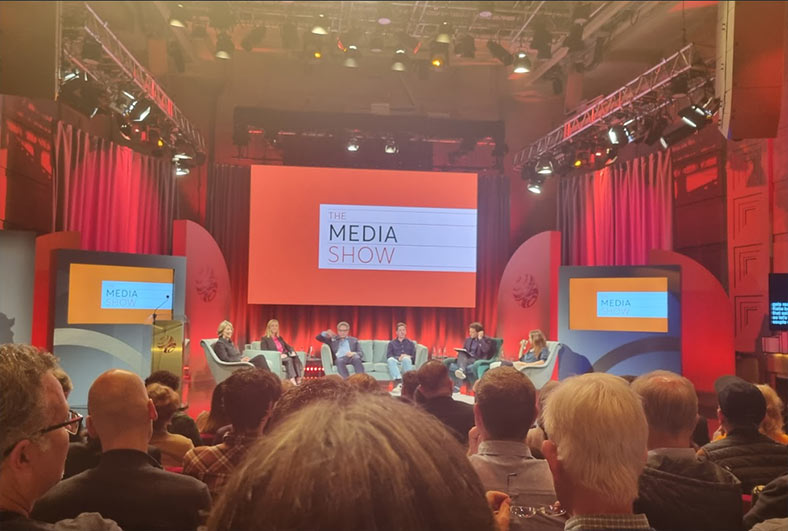Blog / Events / Journalists
Media Freedom – restrictions, misinformation, and bridging the information gap

What does press freedom mean to you as a journalist? In the UK, the media enjoys relative freedom – sitting 23rd in the recent Press Freedom Index ranking. However, other journalists are not so fortunate and face threats to their safety, government interference, and laws designed to punish them for their work.
In a recent live recording of The Media Show ahead of World Press Freedom Day, the programme focused on current restrictions and what can be done to bridge the gaps in information.
Concerns for media freedom in Iran, China, and Russia
The Centre for Media at Sheffield University has expressed concerns about the global decline in media freedom and the implications it has on democratic societies and the public’s right to access accurate information. Three countries that were highlighted during the discussion are Iran, Russia, and China. Kia Atri, Iran media analyst at BBC Monitoring, pointed out that there are red lines in Iranian media with restrictions on what can be spoken about:
‘You cannot criticise Islam, you can’t criticise the founder of the Islamic Republic, and you can’t criticise the Supreme Leader of Iran,’ he explained. The Iranian government is also introducing legislation to create its own national information network, which would make it more difficult to publish articles and media online anonymously.
Kerry Allen, China media analyst at BBC Monitoring, highlighted that ‘it’s very very difficult to get access to independent media in China’. Platforms such as Google and Facebook don’t exist and instead they have state-run alternatives. To even access these, Chinese citizens and journalists have to share a large amount of personal information so they are aware of their digital footprint. Outlets like CGTN are also growing their presence abroad, meaning ‘when people in China go overseas, they still have access to media that is state run,’ and therefore may be less likely to consider independent media.
Most Russian media is governed by the state, meaning media freedom is low, and according to Francis Scarr, Russia media analyst at BBC Monitoring, ‘a large proportion of the population is willing to consume the extremely anti-Western/anti-Ukrainian narratives that are being put out by the state media.’ This has been reinforced on social media, too. Francis explained that ‘even though ostensibly social media platforms such as Facebook, Twitter, and Instagram are blocked in Russia, you have officials from the Russian government who are using them to put out and amplify anti Western messages’.
Getting around the state control
While countries and governments can control the flow of information and data, there are ways for people to get around this. Joe Tidy, cyber correspondent at BBC News, spoke about circumvention methods such as virtual private networks (VPNs) and proxies. Plus, social network apps like WhatsApp are very secure due to their end-to-end encryption. ‘This is partly why governments around the world hate it; because it’s so secure,’ Joe explained, adding that ‘we’ve seen bans in North Korea and Iran and intermittent bans in places like Syria’.
So can independent media operate in countries with restrictions? Famil Ismailov, news editor at BBC Russian Service, explained how publishers are able to overcome this barrier in Russia. ‘YouTube is massively popular and is used by opposition and independent media to deliver their news to the audiences and also the simple thing – email. Newsletters are very popular in Russia and lots of media outlets use newsletters in order to bring their vision of the news to the audience’s that want them’.
The BBC’s role in global media freedom
The BBC World Service was established over 90 years ago in 1932 and Jonathan Munro, director of journalism and deputy CEO at the BBC, said ‘the need for the World Service for impartial free journalism around the world has gone up and up, as more and more territories have got editorial restrictions’. That is especially the case when countries like Russia and China are allegedly spending billions on state sponsored journalism.
Evie Aspinall, director of the policy think tank the British Foreign Policy Group, believes ‘the real USP and benefit of the BBC is that it’s seen to be impartial and is trusted. It’s repeatedly and consistently been seen as the most trusted news outlet around the world. There’s real benefits for that in terms of promoting democracy internationally and enabling debate in nations that otherwise wouldn’t have access to such media’.
For more on the media landscape in 2024, check out key takeaways from this year’s Journalism.co.uk Newsrewired conference.

